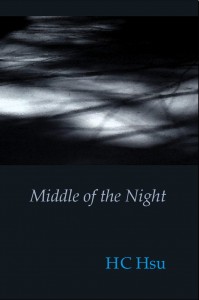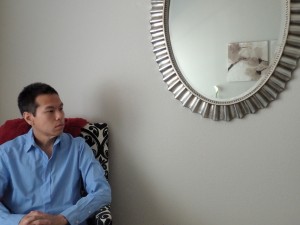Middle of the Night, fiction by HC Hsu
ISBN: 978-0-9904287-4-9
6 x 9 ; 138 pages; 19.50
Available now
Night. When serotonin levels in the brain are pulled to their highest, aching peak. When the soul ventures away from its cage. When a woman exchanged a story for her life; when men, drunk, spoke to each other of love. Night is when ‘ghosts and demons are most powerful,’ and when men turn into wolves. Night is for dreamers. Night is for insomniacs. Night is death. Night is rest. Night is wandering. Night is waiting.
Taking Tang poet Bai Juyi’s poem ‘Come in the middle of the night/Gone at the break of dawn/Come as a fleeting dream of spring/Gone as a morning cloud vanishing without a trace’ as inspiration, Middle of the Night is The Best American Essays nominee HC Hsu’s collection of award-winning personal essays from 2009-2014. Arranged by time written rather than date, these circadianly adrift essays explore love and sex, history and identity, hopes, nightmares, and other nocturnal joys and quotidian tyrannies haunting our sunlit existence.
From a ghost-hunting chronicle in a famed Buddhist temple in rural Japan, to childhood memories of night markets, ancestor worship and martial law in metropolitan Taipei; from praising Elfriede Jelinek’s pitch-black contempt, to lambasting Christ’s ideal of compassion; from a vignette on crying at night and other habits after dark, to a sustained somnambulant philosophical meditation on the ontological virtues of chicharrónes—a synchronicity emerges in these essays in the way they reveal the shadowy memories and experiences of a young ‘Easterner’ living in the ‘West,’ as well as of all those who consider themselves migrants, in the broadest sense, in the first light of a new dawn of globalization and diaspora.
Middle of the Night will appeal to fans of such contemporary essay works as Phillip Lopate’s Against Joie de Vivre, Richard Rodriguez’s Hunger of Memory and Ha Jin’s Writer as Migrant. This tightly themed collection filtering the kaleidoscope of Asian migrational and transmigrational phenomena—from WW2 to MAG—through a 1001 Nights-like parable introduces a new and exciting literary voice and will appeal widely to Asian and Asian American audiences, as well as anyone interested in what makes the lives of these people, here and now, unique and universal.
HC Hsu is the author of the short story collection Love Is Sweeter (Lethe, 2013). Finalist for the Wendell Mayo Award and the South Pacific Review and The Austin Chronicle short story prizes, Third Prize Winner of the Memoir essay competition, First Place Winner of A Midsummer Tale Contest, and The Best American Essays Nominee, he has written for Words Without Borders, Two Lines, PRISM International, Renditions, Far Enough East, Cha, Pif, Big Bridge, Iodine, nthposition, 100 Word Story, China Daily News, Liberty Times, Epoch Times, and many others. He has served as translator for the US Congressional-Executive Commission on China, and his translation of 2010 Nobel Peace Prize winner Liu Xiaobo’s biography Steel Gate to Freedom (Rowman & Littlefield) is out July 3, 2015.

